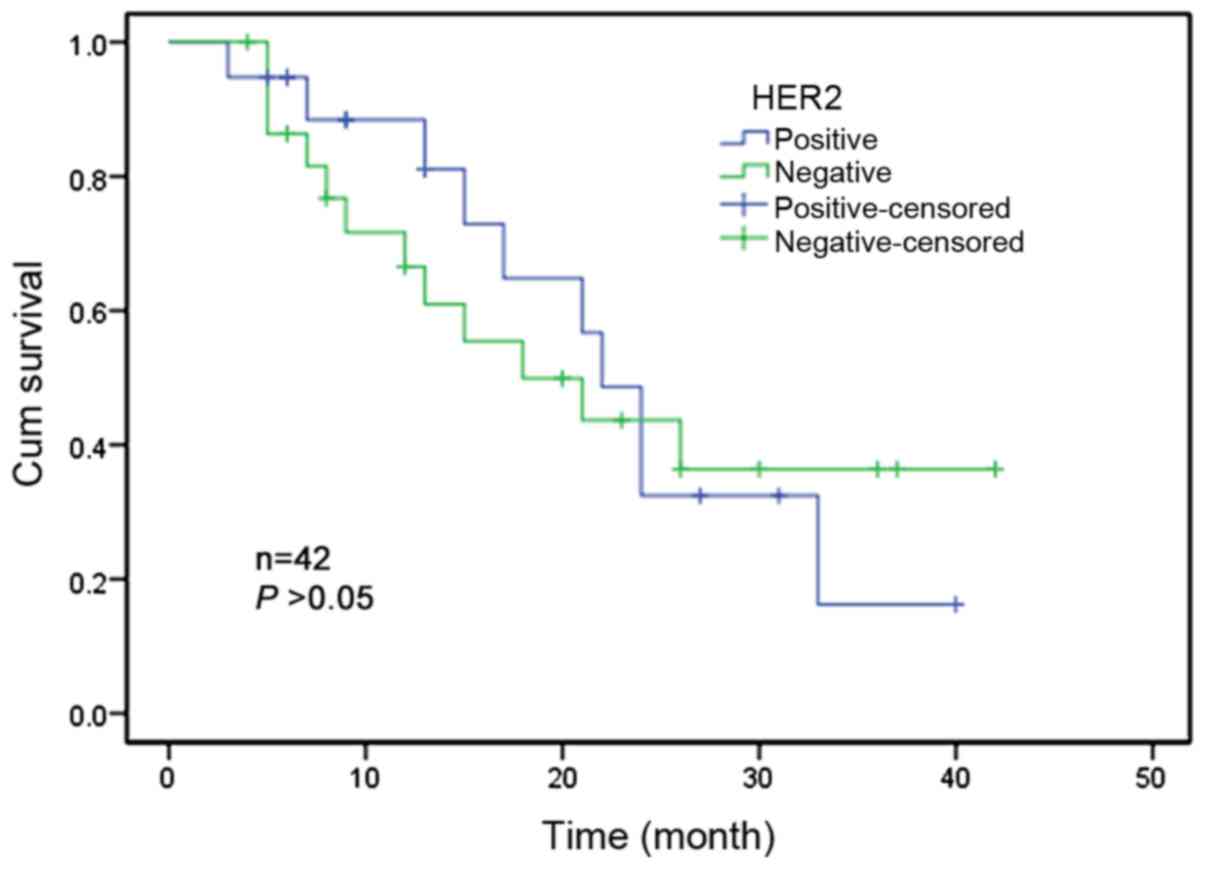|
1
|
Zheng R, Zeng H, Zhang S and Chen W:
Estimates of cancer incidence and mortality in China, 2013. Chin J
Cancer. 36(66)2017.PubMed/NCBI View Article : Google Scholar
|
|
2
|
Gupta B and Kumar N: Worldwide incidence,
mortality and time trends for cancer of the oesophagus. EurJ Cancer
Prev. 26:107–118. 2017.PubMed/NCBI View Article : Google Scholar
|
|
3
|
Zhou YX, Zhou KM, Liu Q, Wang H, Wang W,
Shi Y and Ma YQ: The effect of glut1 and c-myc on prognosis in
esophageal squamous cell carcinoma of Kazakh and Han patients.
Future Oncol. 14:1801–1815. 2018.PubMed/NCBI View Article : Google Scholar
|
|
4
|
Kim T, Grobmyer SR, Smith R, Ben-David K,
Ang D, Vogel SB and Hochwald SN: Esophageal cancer: The five year
survivors. J Surg Oncol. 103:179–183. 2011.PubMed/NCBI View Article : Google Scholar
|
|
5
|
Sagara Y, Kamada Y, Yamamoto Y, Tanaka M,
Kubo M, Yamaguchi R, Nishimura R and Mitsuyama S: Study on the
state of implementation of HER2 testing and positive ratios in
patients with breast cancer in the Kyushu-Okinawa region of Japan.
Breast Cancer. 19:315–320. 2012.PubMed/NCBI View Article : Google Scholar
|
|
6
|
Rosińska A, Rosiński G and Hołubowicz R:
Advdnces on the HER-2/neu and oncotherapy. Acta Academiae Medicinae
Cpaf 62, 2008.
|
|
7
|
Halling KC and Kipp BR: Fluorescence in
situ hybridization indiagnostic cytology. Surg Oncol Clin N Am.
18:411–422. 2009.
|
|
8
|
Fritcher EG, Brankley SM, Kipp BR, Voss
JS, Campion MB, Morrison LE, Legator MS, Lutzke LS, Wang KK, Sebo
TJ and Halling KC: A comparison of conventional cytology,DNA ploidy
analysis,and fluorescence in situ hybridization for the detection
of dysplasia and adenocarcinoma in patients with barrett's
esophagus. Hum Pathol. 39:1128–1135. 2008.PubMed/NCBI View Article : Google Scholar
|
|
9
|
Dietel M, Ellis IO, Höfler H, Kreipe H,
Moch H, Dankof A, Kölble K and Kristiansen G: Comparison of
automated silver enhanced in situ hybridisation (SISH) and
fluorescence ISH (FISH) for the validation ofHER2gene status in
breast carcinoma according to the guidelines of the American
society of clinical oncology and the college of American
pathologists. Virchows Arch. 451:19–25. 2007.PubMed/NCBI View Article : Google Scholar
|
|
10
|
Amin MB, Edge S, Greene F, (eds), et al:
AJCC Esophageal and esophagogastric junction. AJCC Cancer Staging
Manual. 8th edition. NewYork, Springer; pp185-202: 2017.
|
|
11
|
Huang JX, Zhao K, Lin M, Wang Q, Xiao W,
Lin MS, Yu H, Chen P and Qian RY: HER2 gene amplification in
esophageal squamous cell carcinoma is less than in gastroesophageal
junction and gastric adenocarcinoma. Oncol Lett. 6:13–18.
2013.PubMed/NCBI View Article : Google Scholar
|
|
12
|
Shroff GS, De Groot PM,
Papadimitrakopoulou VA, Truong MT and Carter BW: Targeted therapy
and immunotherapy in the treatment of non-small cell lung cancer.
Radiol Clin North Am. 56:485–495. 2018.PubMed/NCBI View Article : Google Scholar
|
|
13
|
Alvarez RH, Valero V and Hortobagyi GN:
Emerging targeted therapies for breast cancer. J Clin Oncol.
28:3366–3379. 2010.PubMed/NCBI View Article : Google Scholar
|
|
14
|
Lin CY, Yang SJ, Peng CL and Shieh MJ:
Panitumumab-Conjugated and platinum-cored pH-sensitive apoferritin
nanocages for colorectal cancer-targeted therapy. ACS Appl Mater
Interfaces. 21:6096–6106. 2018.PubMed/NCBI View Article : Google Scholar
|
|
15
|
Vu T, Sliwkowski MX and Claret FX:
Personalized drug combinations to overcome trastuzumab resistance
in HER2-positive breast cancer. Biochim Biophys Acta. 1846:353–365.
2014.PubMed/NCBI View Article : Google Scholar
|
|
16
|
Gutierrez CC and Schiff RR: HER2: Biology,
detection, and clinical implications. Arch Pathol Lab Med.
135:55–62. 2011.PubMed/NCBI View Article : Google Scholar
|
|
17
|
Yan SY, Hu Y, Fan JG, Tao GQ, Lu YM, Cai
X, Yu BH and Du YQ: Clinicopathologic significance of HER-2/neu
protein expression and gene amplification in gastric carcinoma.
World J Gastroenterol. 17:1501–1506. 2011.PubMed/NCBI View Article : Google Scholar
|
|
18
|
Li HH, Ma F, Zeng X, Wang JY, Yuan P, Fan
Y and Xu BH: Comparison of fluorescence in situ hybridization and
immunohistochemistry assessment for Her-2 status in breast cancer
and its relationship to clinicopathological characteristics.
Zhonghua Yi Xue Za Zhi. 91:76–80. 2013.(In Chinese).
|
|
19
|
Koo JS and Kim SH: EGFR and HER-2 status
of non-small cell lung cancer brain metastasis and corresponding
primary tumor. Neoplasma. 58:27–34. 2011.PubMed/NCBI View Article : Google Scholar
|
|
20
|
Bouché O and Penaultllorca F: HER-2 and
gastric cancer: A novel therapeutic target for trastuzumab. Bull
Cancer. 97:1429–1440. 2010.PubMed/NCBI View Article : Google Scholar : (In French).
|
|
21
|
Sato-Kuwabara Y, Neves JI, Fregnani JH,
Sallum RA and Soares FA: Evaluation of gene amplification and
protein expression of HER-2/neu in esophageal squamous cell
carcinoma using fluorescence in situ hybridization (FISH) and
immunohistochemistr. BMC Cancer. 7(9)2009.PubMed/NCBI View Article : Google Scholar
|
|
22
|
Wei Q, Chen L, Sheng L, Nordgren H, Wester
K and Carlsson J: EGFR, HER-2 and HER3 expression in esophageal
primary tumours and corresponding metastases. Int J Oncol.
31:493–499. 2007.PubMed/NCBI
|
|
23
|
Reichelt U, Duesedau P, Tsourlakis MC,
Quaas A, Link BC, Schurr PG, Kaifi JT, Gros SJ, Yekebas EF, Marx A,
et al: Frequent homogeneous HER-2 amplification in primary and
metastatic adenocarcinoma of the esophagus. Mod Pathol. 20:120–129.
2007.PubMed/NCBI View Article : Google Scholar
|
|
24
|
Zhan N, Dong WG, Tang YF, Wang ZS and
Xiong CL: Analysis of HER-2 gene amplification and protein
expression in esophageal squamous cell carcinoma. Med Oncol.
29:933–940. 2012.PubMed/NCBI View Article : Google Scholar
|
|
25
|
Niemiec JA, Adamczyk A, Małecki K,
Majchrzyk K and Ryś J: Relationships between immunophenotype, Ki-67
index, microvascular density, Ep-CAM/P-cadherin, and MMP-2
expression in early-stage invasive ductal breast cancer. Appl
Immunohistochem Mol Morphol. 20:550–560. 2012.PubMed/NCBI View Article : Google Scholar
|
















